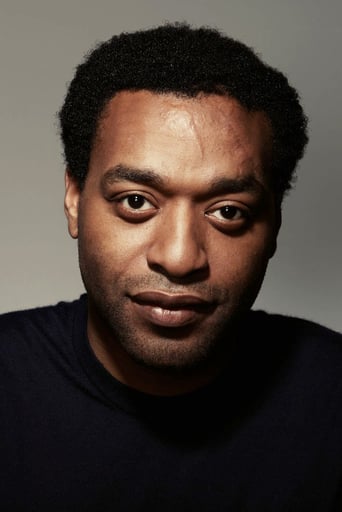Forumrxes
Yo, there's no way for me to review this film without saying, take your *insert ethnicity + "ass" here* to see this film,like now. You have to see it in order to know what you're really messing with.
Catangro
After playing with our expectations, this turns out to be a very different sort of film.
Mathilde the Guild
Although I seem to have had higher expectations than I thought, the movie is super entertaining.
Justina
The film never slows down or bores, plunging from one harrowing sequence to the next.
D A
This acceptable dramatization to the horrific Tsunami tragedy of late 2004, under-examined still in the States with mind boggling statistics recalling something out of a biblical nightmare, does a fine job at capturing many different perspectives witnessing and withering to global catastrophe, however protracted and misaligned the dignified project can be. In reliable HBO fashion, the made for TV film barely feels like it, boasting arresting production, reliable performances, and a well rounded script. What does misfire though, is a prolonged detailing of these painful aftereffects, even worse when split up on two separate DVD's while only clocking in just over 3 hours. In keeping with the original miniseries, a bland DVD transfer only illustrates an awkwardly resolute second part over the first part's initial effectiveness.Starting with the brief but frighteningly executed Tsunami itself, the film proceeds to detail 4-5 different characters amidst the chaos for it's remaining 3 hours, utilizing plenty of research to intertwine a few fairly developed narratives of varied and conflicting natures to disturbing effect. The result at times feels necessary though in time merely competent. Although a wide array of perspective lends to a sensitive portrayal of so much horrific fallout for all those involved with this unprecedented event, any initial universal appeal the soulful disaster piece warrants became overshadowed by the disappointingly connected subplots insistence to overstay their welcome (and become more Babel then needed). The fact also remains that despite Thailand being represented in the film, the principal characters are a Western filter to understanding this tragedy that is assumed to be more engaging to your typical American television surfer. Anyone who would not feel insulted at it's slightly sensational leanings then should feel enlightened by a detailed, multifaceted chronicle that should remain the definitive movie on the event.It does feel stretched out (getting the first disc is satisfying enough, though would definitely leave a few cliffhangers), but for the haunting location set design alone, Tsunami: The Aftermath will help take comfortable, middle-class citizens into the heart of physical and emotional loss with a click of their remote.
AJBraxton
It is television after all so I kept waiting for the good news. Where was it? Certainly in this story of massive human suffering there has to be some good news. Okay... I'll give the producer/director/writer some leeway in that they wanted to tell a story about the Tsunami for a western audience so that probably accounts for the seemingly bizarre absence of any Thai person of note in the movie with the exception of hard working kitchen staff boy. Thank god for the western NGO worker to help those poor villagers who had fled to the hills . . . and then the Brits who came to the aid of the villagers. I am living in Thailand now and find that the Thai are quite capable (despite a bizarre bloodless coup of a freely elected Prime Minister to restore democracy?) of doing some really good things.. and doing quite a bit for themselves. There was an attempt to show the difference in response to this disaster on the part of the Thai (why it was o.k. for them to burn bodies w/o identification). But.. please.. where was the good news in this movie?
bob the moo
A group of European scuba divers are out at sea off the coast of Thailand on Boxing Day 2004. They return to the shore to find destruction as far as they can see, an ocean full of bodies and no sign of the loved ones they left behind. Meanwhile, on the shore itself the survivors of the tidal wave flee for higher ground for fear of a second wave hitting. As the authorities struggle to return some sense of order or control, the survivors try to find their missing relatives whether they are dead or alive.I wasn't sure about whether to watch this or not because I found it difficult to imagine how a film could adequately capture the sheer sense of horror and the loss of so many hundreds of thousands of lives. And of course, having watched it, the film doesn't really ever manage to give the viewer a sense of how destructive and devastating the disaster was. Of course this is not really the fault of the film but it is generally just difficult to picture that many people dead and difficult to look at footage of missing villages and understand what happened. So this leaves the film to try and deliver it the best it can and fill the film with a handful of characters that can be followed from pre-disaster into the aftermath of the title.In doing this it was never going to be perfect but it does build a cross section of characters and also deal with the emotional impact of the disaster as well as the organisational nightmare that followed as well as the inevitable search for someone to blame or be angry at. The film doesn't manage to do all of these well and indeed some of the threads fall flat; Tim Roth's journalist as an example of one aspect that could have been scaled back a bit. The result of it trying to do a lot is that the film is a bit too long and does feel baggy at some points. The strongest thread is that of the couple played by Ejiofor and Okonedo. They convey the emotions of those who have lost relatives without knowing if they are dead or alive. This part is engaging because of their performances – both of which are wonderful and painfully convincing. Their relationship is real before and after and it hurts to watch what they go through – they are the heart of the film and, although they are European, they embody the loss and pain. The Peabody's (McKee et al) and Machielsen's Tan do this as well but it is not as raw and emotional. The rest of the cast are left with the other material to work with and they all mostly do good work. For all his character's relative unimportance, Roth still does well and he does provide a glue to hold the bigger picture together. Bonneville and Collette provide the organisational side with teeth and meaningful performances.Although the plot wanders a bit in the second half, this film still has enough about it to engage and move. Occasionally baggy it is mostly interesting and holds the attention. The cast are mostly good but the emotional heart of the film is wonderfully delivered by two guttingly real performances from Ejiofor and Okonedo.
paul2001sw-1
The problem with making a film about a well-known disaster is that the obvious line of dramatic development is precluded precisely because everyone knows it before the film starts. In 'Titanic', James Cameron spun a tale about the spirit of the age, which he bound up with the famous event at the heart of the film; but 'Tsumami: the Aftermath' tries no such tricks, and sells us a straightforward catalogue of human misery and suffering. It's all very earnest, and unclear what the point is supposed to be. Countless survivors (with missing relatives) are shown responding with a mixture of dignity and disbelief in reality. This may be one response to tragedy, but it's not the only one, and in this film appears to be celebrated as the highest expression of the human condition: epitomised when one man stands up at a public meeting and is applauded for his heartfelt but impossible demand that his (dead) child is returned to him. Liekwise, the film stresses a view that those on the scene in a non-personal capacity needed to emotionally empathise with the feelings of the suffering, whereas one could argue that, when it comes to the rationing of limited resources, one actually needs officials who can be completely dispassionate, and who can turn down the heart-rending (and conventionally justified) demands of those who cry loudest to meet instead the needs of those with even greater need. Finally, there is a political sub-plot, but this is presented more as a means to the redemption of a cynical journalist (who, as you might have guessed, learns to care) than as an end in itself.The review may sound pretty cynical in itself, and I don't want to belittle the appalling human suffering of the real life tragedy in any way. But this film's obsession with dignified emoting puts a very strange spin on the human condition.






